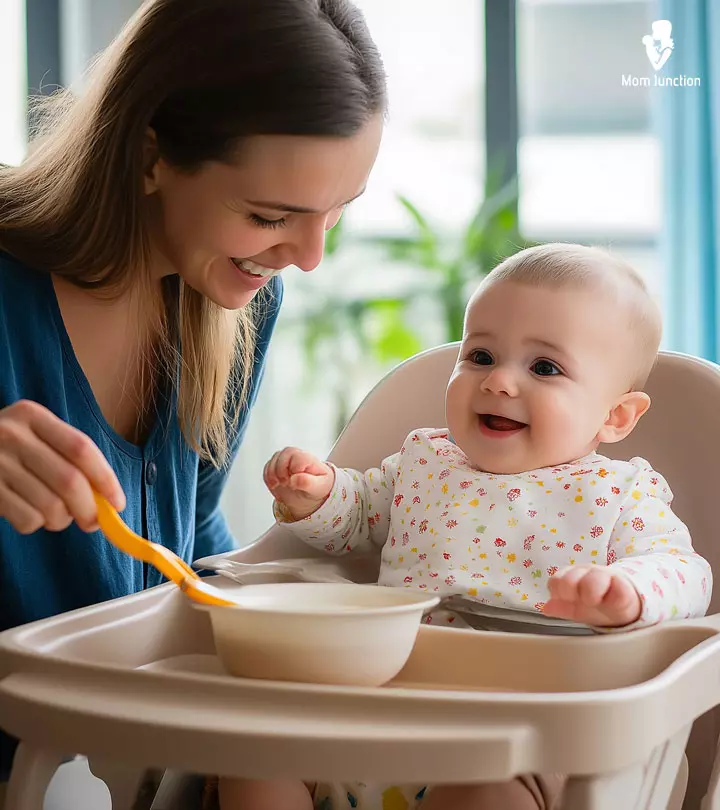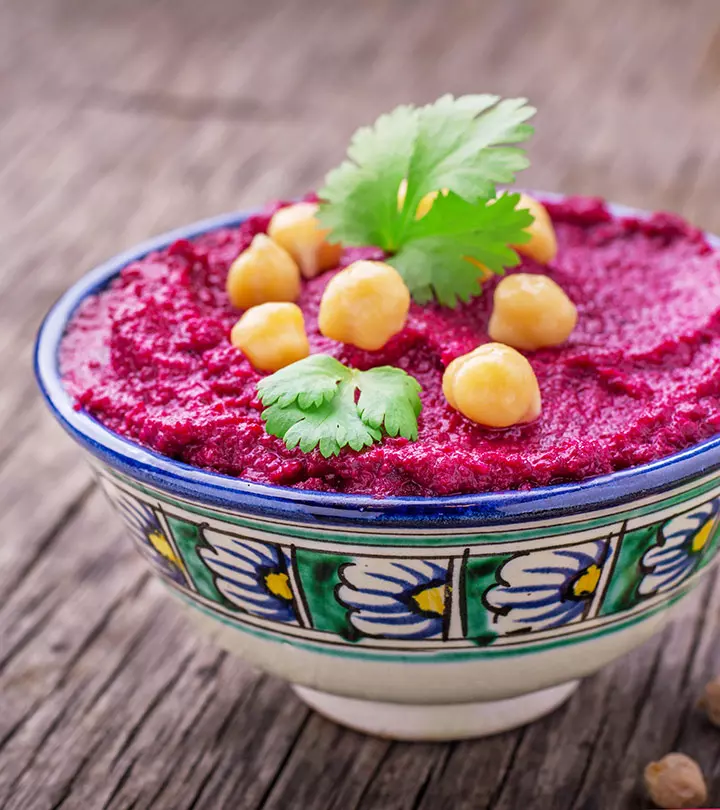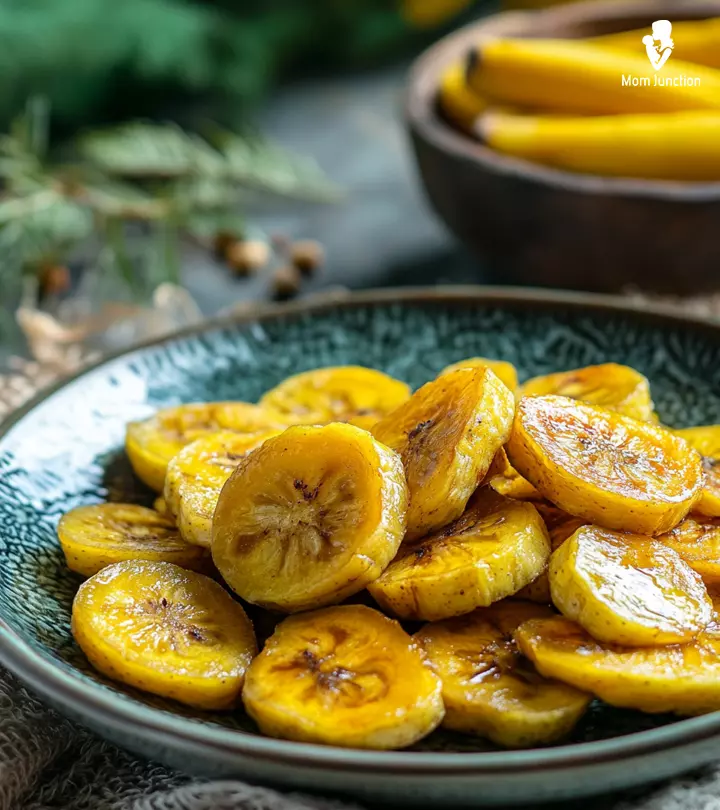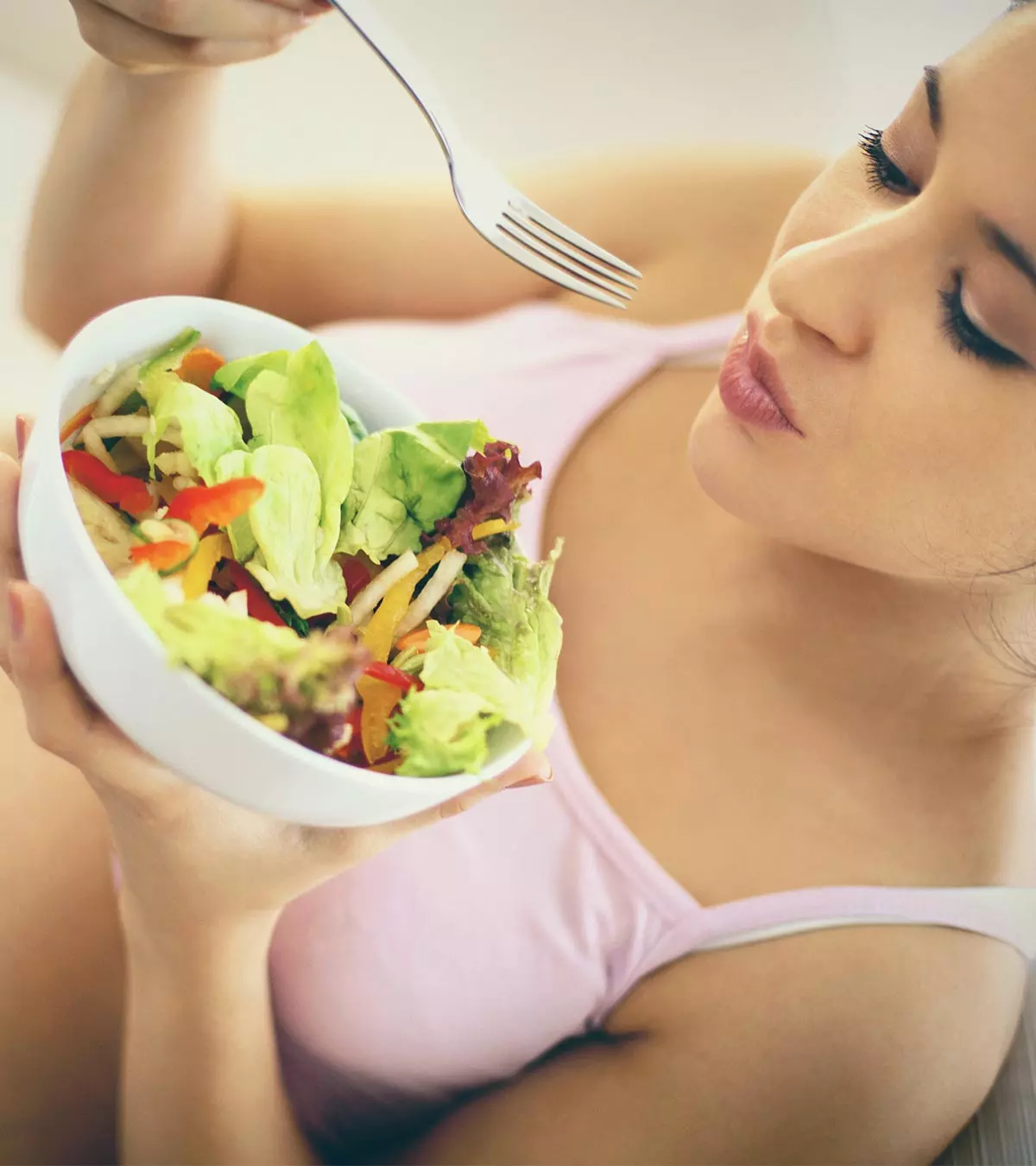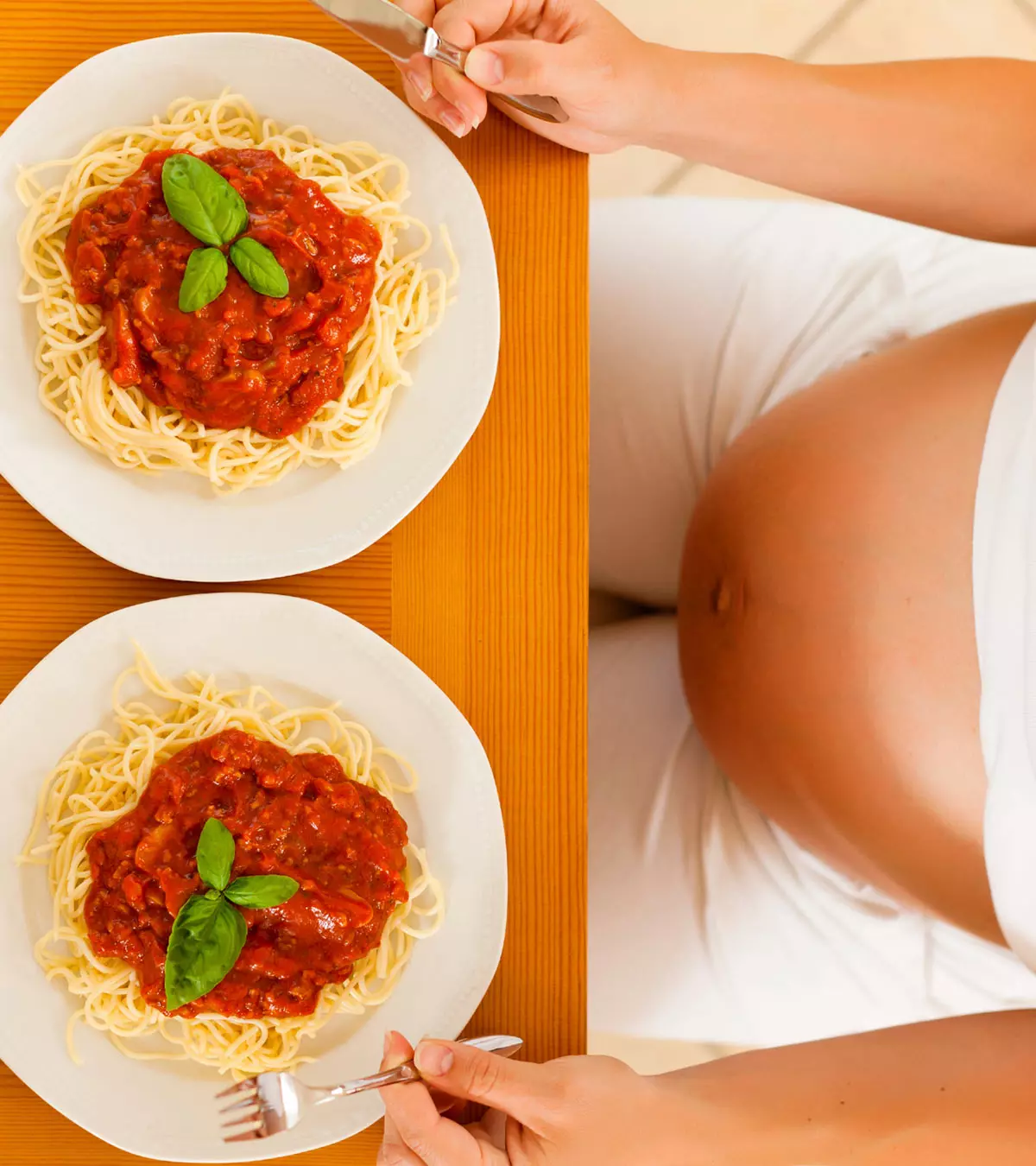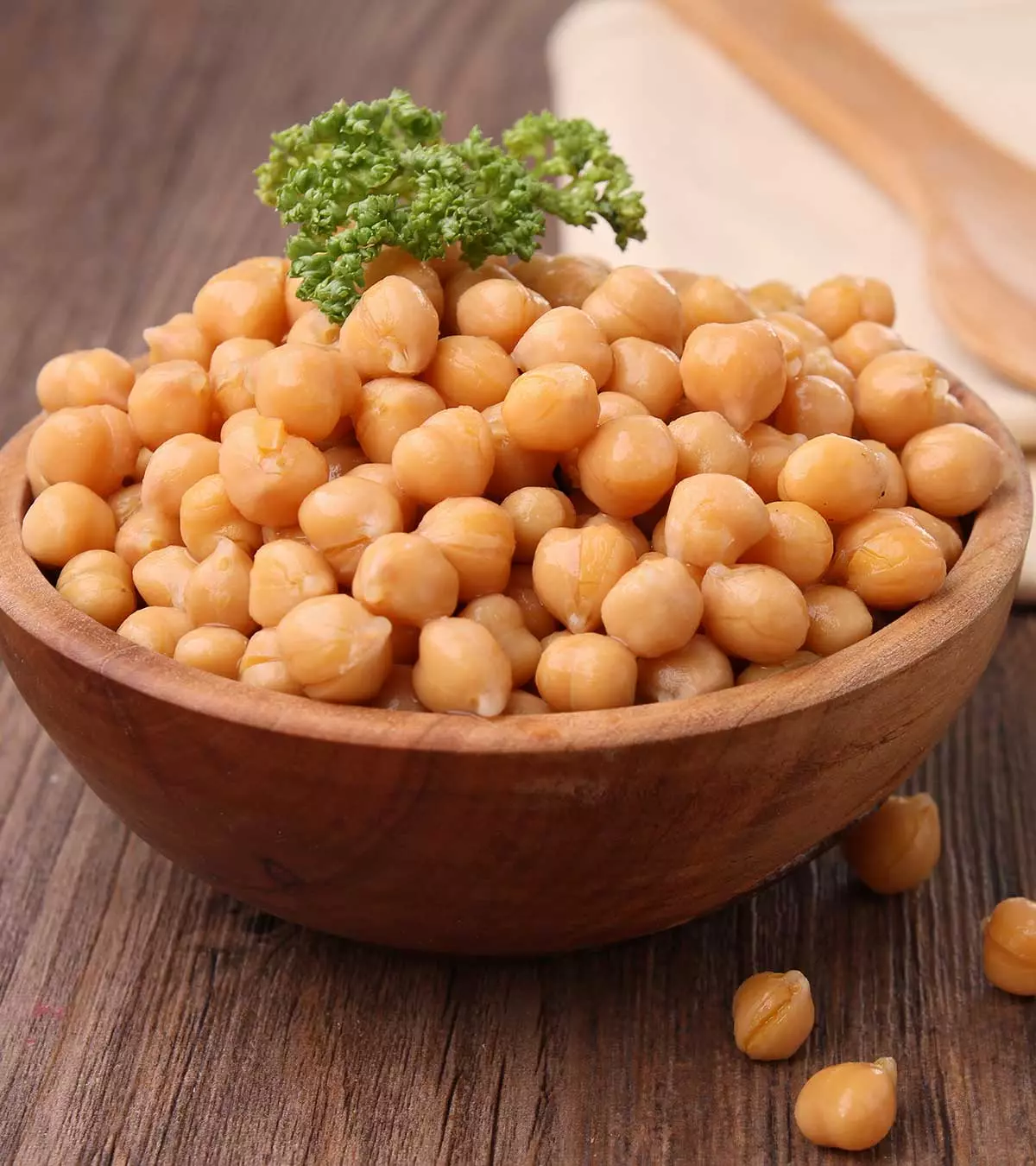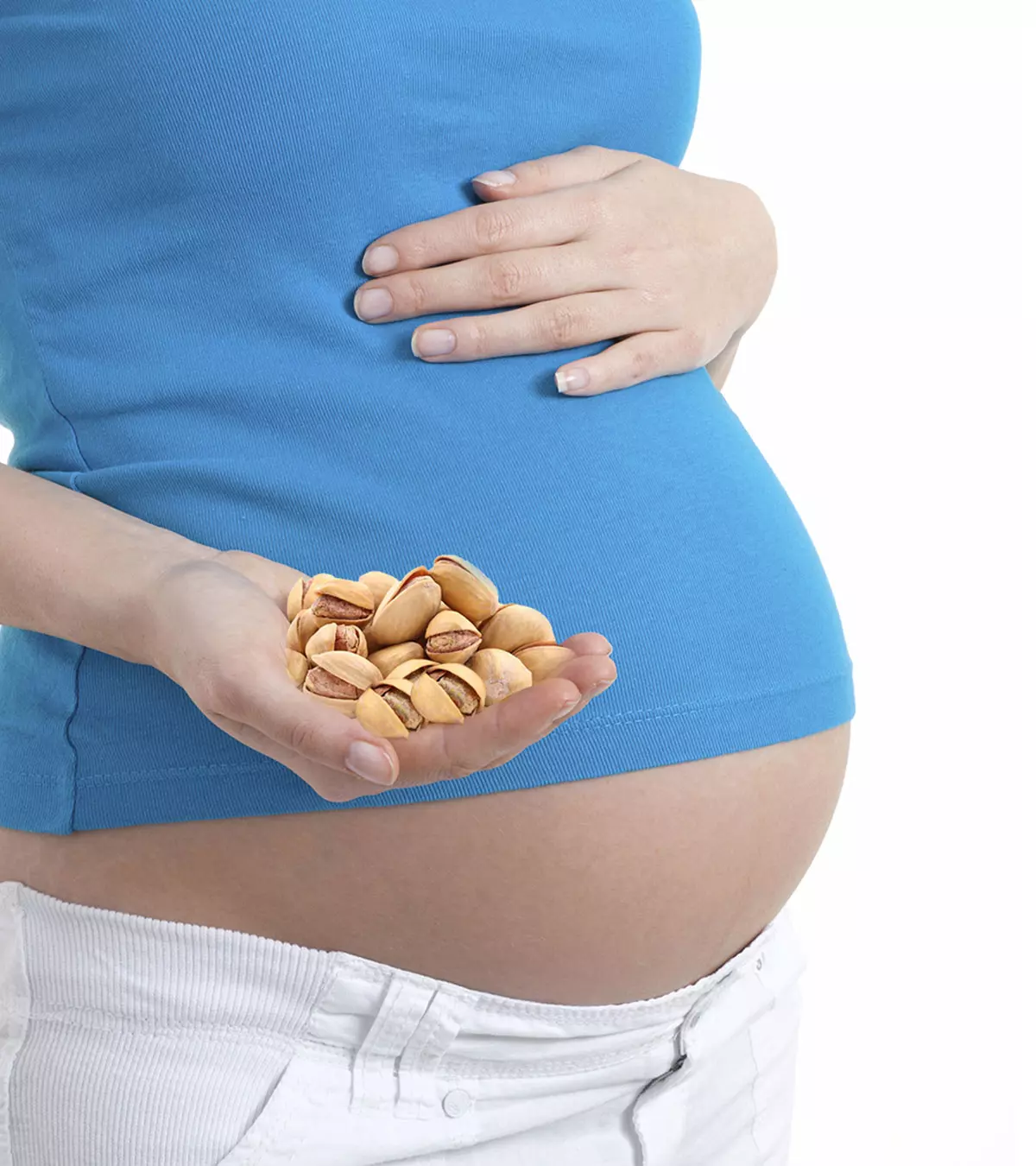
Image: Shutterstock
A few pistachio nuts can immediately add flavor to baked foods, soups, or salads. These crunchy and tasty nuts are packed with various nutrients. Therefore, pistachios during pregnancy are considered extremely healthy. However, everything you eat should be moderate to maintain your pregnancy health. Also, it is wise to be mindful of when and how to eat these delicious nuts for safety. Read this post as we share about eating pistachios during pregnancy and what benefits you and your baby can derive from them.
Key Pointers
- The consumption of plain, unsalted pistachios during pregnancy is considered safe.
- Pistachios are packed with essential nutrients such as protein, fiber, potassium, folate, calcium, and iron, which contribute to fetal growth and development.
- Pistachios aid in regulating blood sugar levels, balancing lipid levels, boosting immunity, and preventing anemia in pregnant women.
- Consuming pistachios has added benefits including anti-inflammatory properties, relief from joint pains, and positive impact on fetal brain development.
- Overconsumption of pistachios while pregnant may result in bloating and abdominal discomfort.
Is It Safe To Eat Pistachios During Pregnancy?
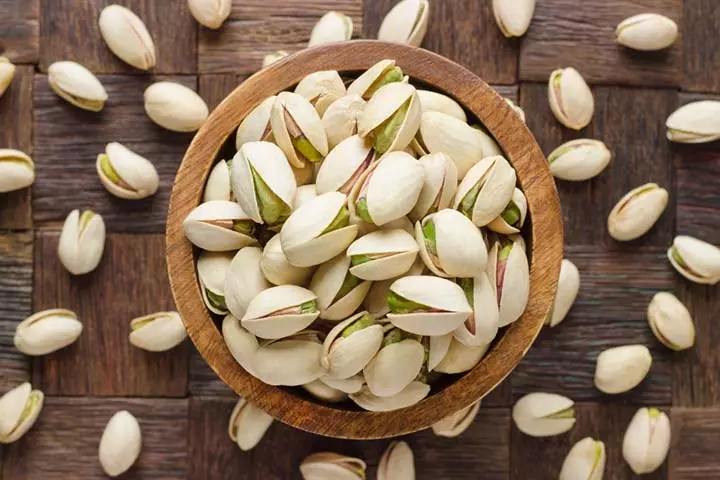
Yes, it is safe to include pistachios during pregnancy (1). They are power-packed with protein, fiber, potassium, folate, calcium, and iron, all of which are important for the growth and development of the fetus.
What Are The Benefits Of Pistachios During Pregnancy?
The nutrients present in pistachios are beneficial during pregnancy and aid in the healthy development of the baby.
They possess several benefits that aid prenatal nutrition, such as:
1. Aids fetal development

Pistachios contain a good amount of protein that is essential for the development of your unborn baby’s tissues and muscles (2). It also keeps your weight under check (3) by regulating blood sugar levels thus minimizing the risk for gestational diabetes.
Additionally, pistachios contain folate, which supports fetal brain development and lowers the risk of neural tube defects (4) (5).
 Nutrition fact
Nutrition fact2. Balances lipid levels
The high concentration of monounsaturated fatty acids in pistachios lowers bad cholesterol and increases good cholesterol levels, therefore, balancing lipidsiCompounds made of fat or oil that help to store energy, aid digestion, regulate hormones, and absorb vitamins. (6).
3. Boosts immunity levels
Pistachios are rich in antioxidants including caroteneiNatural dyes in plants get converted into Vitamin A upon ingestion by humans. , polyphenolic substancesiNaturally occurring antioxidant compounds found in food items such as fruits, vegetables, coffee, and tea. , and vitamin A and E that help boost immunity (7).
4. Prevents anemia
According to the World Health Organization (WHO), 36.5% of pregnant women were affected globally by anemia in 2019. Pistachios are rich in iron and other essential minerals, which help form red blood cells, making them an excellent dietary addition to combat anemia (8). Hence, including these nuts in your diet will help prevent anemia, especially during pregnancy when your body needs more than the normal blood cells.
 Quick fact
Quick fact5. Treats constipation
Being rich in fiber, pistachios aid easy digestion and regulate bowel movements. They can also provide relief from constipation which can develop due to hormonal changes in early pregnancy (9).
6. Anti-inflammatory nature

Pistachios are anti-inflammatory in nature and help in fighting joint pains and swelling that are common during pregnancy (10).
7. Good for fetal brain development
Pistachios contain good amounts of omega-3 fatty acids such as oleic and linoleic acids. These healthy fats are essential for the brain development of the baby (11).
Keep reading for the complete nutritional profile of pistachios.
Nutritional Value Of Pistachios
Nutrients present in 100 grams of raw pistachios are as follows (4):
| NUTRIENT | AMOUNT | |
|---|---|---|
| Calories | 560kcal | |
| Water | 4.37g | |
| Carbohydrates | 27.17g | |
| Sugars | 7.66g | |
| Protein | 20.16g | |
| Fiber | 10.6g | |
| Fat | 45.32g | |
| VITAMINS | ||
| Thiamin (Vitamin B1) | 0.870mg | |
| Riboflavin (Vitamin B2) | 0.160mg | |
| Niacin (Vitamin B3) | 1.300mg | |
| Pyridoxine (Vitamin B6) | 1.700mg | |
| Folic acid (Vitamin B9) | 51mcg | |
| Ascorbic acid (Vitamin C) | 5.6mg | |
| Retinol (Vitamin A) | 516IU | |
| Alpha-tocopherol (Vitamin E) | 2.86mg | |
| ELECTROLYTES | ||
| Potassium | 1025mg | |
| Sodium | 1mg | |
| MINERALS | ||
| Calcium | 105mg | |
| Iron | 3.92mg | |
| Phosphorus | 490mg | |
| Magnesium | 121mg | |
| Zinc | 2.20mg | |
| LIPIDS | ||
| Total saturated fatty acids | 5.907g | |
| Total monounsaturated fatty acids | 23.257g | |
| Total polyunsaturated fatty acids | 14.380g | |
g=grams; mg=milligrams; IU=International Units
While pistachios are nutritious, their benefits are greater only when you consume them in the right quantity and stick to plain, unsalted pistachio nuts in their shells.
How Many Pistachios Can You Eat Per Day?
You may have up to ½ an ounce or approximately 24 pistachios per day (1). You should not eat more than the suggested quantity as it could lead to excess essential oils in the body that could be harmful to the brain (12).
What Are The Possible Side Effects Of Eating Pistachios During Pregnancy?

Some things you should keep in mind while including pistachios are:
- They have fructansiA naturally occurring carbohydrate found in many vegetables, fruits, and legumes. that will cause digestive problems such as constipation, diarrhea, bloating, abdominal pain and flatulence (13).
- Pistachios may also cause a food intolerance and nut allergy, especially if there is a history of food allergies in the family.
- Roasted nuts coated in salt can have high sodium content that may elevate blood pressure (14). So it is best to choose the plain, unsalted variety to reduce the risk for pre-eclampsia.
 Point to consider
Point to considerA few precautions while including pistachios in your diet can be a good idea.
How To Include Pistachios In Your Diet?

Here are a few interesting ways in which you can incorporate pistachio nuts into your diet:
- Toss some pistachios to the fruit bowl, and consume it fresh.
- Make a rough powder of them, and use as a dip to chicken before frying or grilling.
- Sprinkle finely diced pistachios to oatmeal, yogurt or cereals for a nutritious breakfast.
- Mix in a milkshake along with almonds, cardamom, and saffron for a super-filling beverage.
Pista Recipes For Pregnant Women
Here are some delectable and healthy pista recipes expecting women can consume throughout pregnancy. These recipes will help you consume pista during pregnancy in different ways.
1. Pista and avocado toast
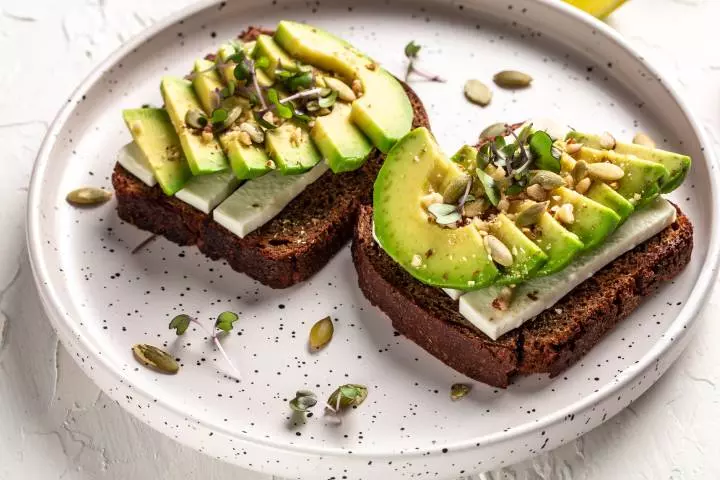
You will need:
- 2 slices whole-grain bread
- ½ avocado (thinly sliced)
- 1tbsp pistachios (finely chopped)
- Olive oil, for drizzling
How to make:
- Toast the bread and set aside on a plate.
- Spread sliced avocado on each slice and sprinkle pistachios on top.
- Drizzle some olive oil and enjoy!
2. Pistachio frozen yogurt
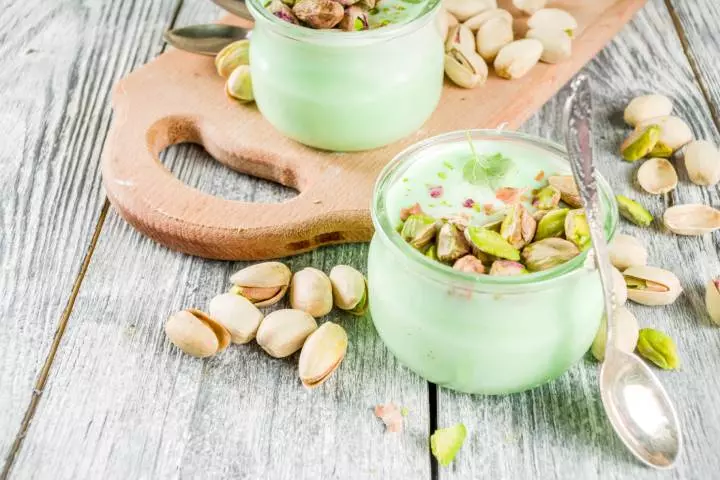
You will need:
- 2 bananas (mashed)
- 1 cup unsweetened frozen yogurt
- ½ cup pistachios (thinly sliced)
- ½ cup dates puree
- 1tsp vanilla bean paste
How to make:
- Put frozen yogurt, mashed bananas, dates puree, and vanilla bean paste into a bowl. Whisk the ingredients to make a smooth fluid.
- Add some crushed pistachios to the mixture and whisk rhythmically to keep the mixture airy.
- Pour into a bowl and sprinkle the remaining crushed pistachios on top.
- Cover the bowl tightly with plastic wrap to prevent icicles.
- Freeze for three to four hours. Once the yogurt is set, scoop and enjoy.
Frequently Asked Questions
1. What is the best time to eat pistachios during pregnancy?
During pregnancy, it’s important to eat a balanced diet that includes a variety of nutrient-dense foods. Pistachios are a healthy snacking option that can be enjoyed during pregnancy, but the timing of when you eat them may depend on your personal preferences and schedule. However, you may start eating pistachios right from the first trimester as these nuts can help manage nausea and vomiting and promote the healthy development of the baby’s brain and nervous system (17).
2. Does pistachio cause weight gain in pregnancy?
No. Studies show no association between weight gain and pistachio consumption if eaten as a part of a well-balanced diet. In fact, eating pistachio has been found to help with weight management and may even promote weight loss in obese individuals (18) (19).
3. Which is healthier during pregnancy: almonds or pistachios?
Consumption of both pistachios and almonds during pregnancy is considered healthy for expecting mothers. Both nuts offer beneficial nutrients to support a healthy pregnancy.
Consuming energy-rich nuts such as pista in pregnancy could be beneficial for you and your unborn baby. They contain several micronutrients and proteins that are great for your developing fetus. Moreover, it could help prevent anemia, boost immunity, and promote fetal brain development. You may include pistachios in your salad, milkshake or have them in fresh, raw forms. It is ideal to consume unsalted pistachios in the recommended amounts to stay safe and avoid the risk of side effects such as flatulence, constipation, and increased blood pressure during pregnancy.
Infographic: What Are The Benefits Of Pistachios During Pregnancy?
Fuel your pregnancy with the nutritious power of pistachios! These tasty nuts are a rich source of essential vitamins and minerals to support your and your growing baby’s health. Plus, their satisfying crunch and versatility make them a perfect snack for pregnant women. Read more about the benefits of pistachios through the following infographic. Illustration: Momjunction Design Team
Illustration: Benefits Of Pistachios During Pregnancy
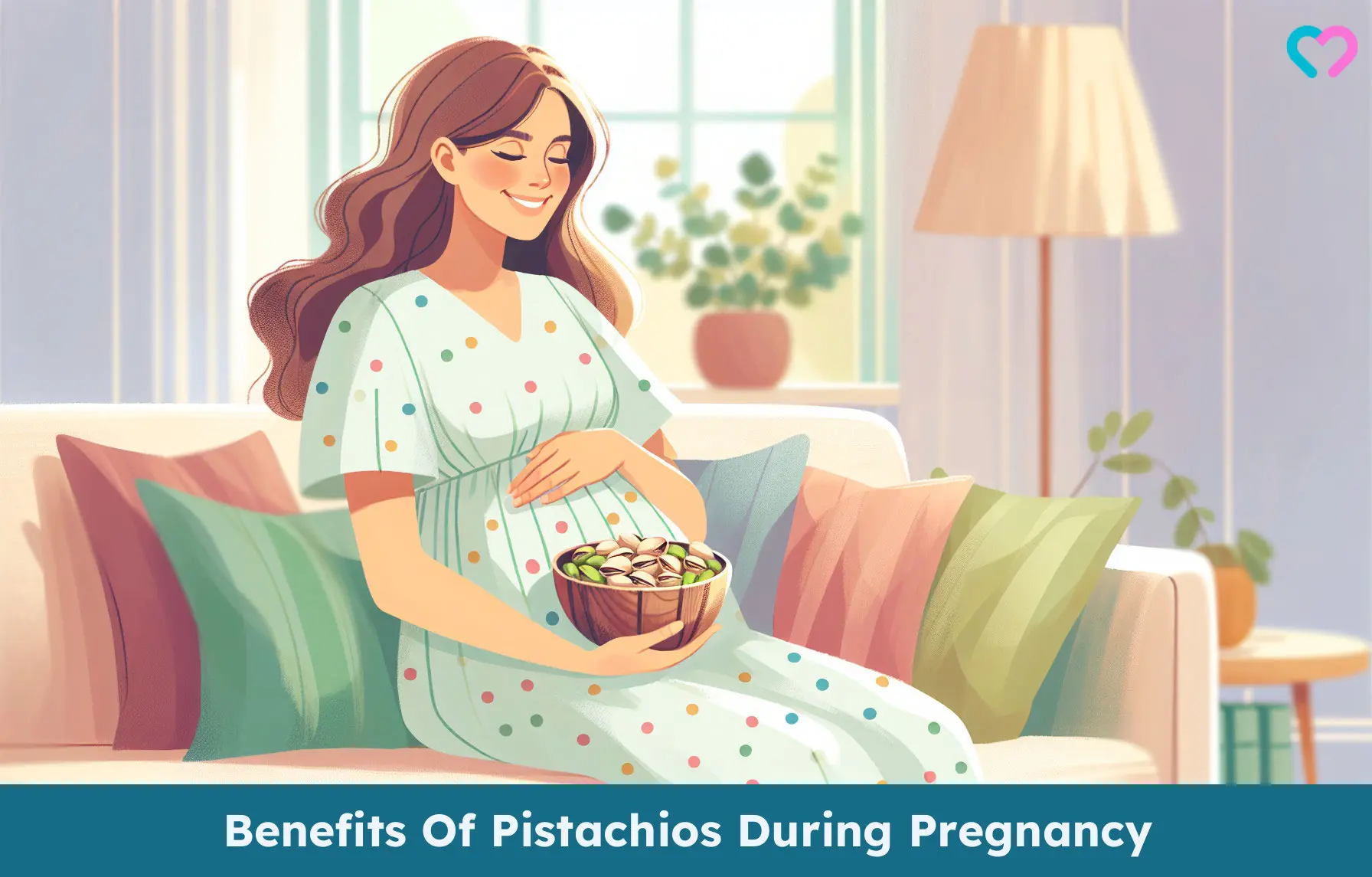
Image: Dall·E/MomJunction Design Team
References
1. Healthy Eating During Pregnancy; UC Davis Medical Center (2013)
2. Eating Healthy During Pregnancy; clinicaltrials.gov
3. Bridget Swinney; Eating Expectantly: Revised and Updated; page 50
4. Nuts, pistachio nuts, raw; USDA
5. Folic Acid for a Healthy Baby; John Hopkins Medicine
6. Pistachios; Colorado State University (2017)
7. James Ponder; Study finds consuming nuts strengthens beneficial brainwave frequencies; Loma Linda University Health
8. Getting Iron from Your Food; UNM Health System
9. Fiber; Oregon State University (2018)
10. Helieh S. Oz; Nutrients, Infectious and Inflammatory Diseases; Nutrients. (2017)
11. Rachel Scherr et al.; Nutrition and Health Info Sheet: Omega-3 Fatty Acids; The Regents of the University of California (2016)
12. Nuts, pistachio nuts, raw; USDA
13. Mary Purdy; Your Brain On Food: Nutrition For The Mind; Dietitians in Integrative and Functional Medicine
14. Amy Fedewa & Satish S. C. Rao; Dietary fructose intolerance, fructan intolerance and FODMAPs; Curr Gastroenterol Rep (2015)
15. Understanding the DASH Diet – 9.374; Colorado State University (2018)
16. 3 Reasons Why Pistachios Can Boost Your Health; Cleveland Clinic
17. High blood pressure during pregnancy; March of Dimes
16. 10 foods that fight nausea during pregnancy; Mother Baby Center
18. Assaf-Balut C. et al.; A Mediterranean Diet with an Enhanced Consumption of Extra Virgin Olive Oil and Pistachios Improves Pregnancy Outcomes in Women Without Gestational Diabetes Mellitus: A Sub-Analysis of the St. Carlos Gestational Diabetes Mellitus Prevention Study; Annals of Nutrition and Metabolism; Krager (2019)
19. Cheryl L. Rock et al.; Effects of Pistachio Consumption in a Behavioral Weight Loss Intervention on Weight Change, Cardiometabolic Factors, and Dietary Intake; Nutrients; MDPI (2020)
Community Experiences
Join the conversation and become a part of our nurturing community! Share your stories, experiences, and insights to connect with fellow parents.
Read full bio of Jacky Bloemraad-de Boer
Read full bio of Swati Patwal
Read full bio of Rebecca Malachi
Read full bio of Aneesha Amonz









